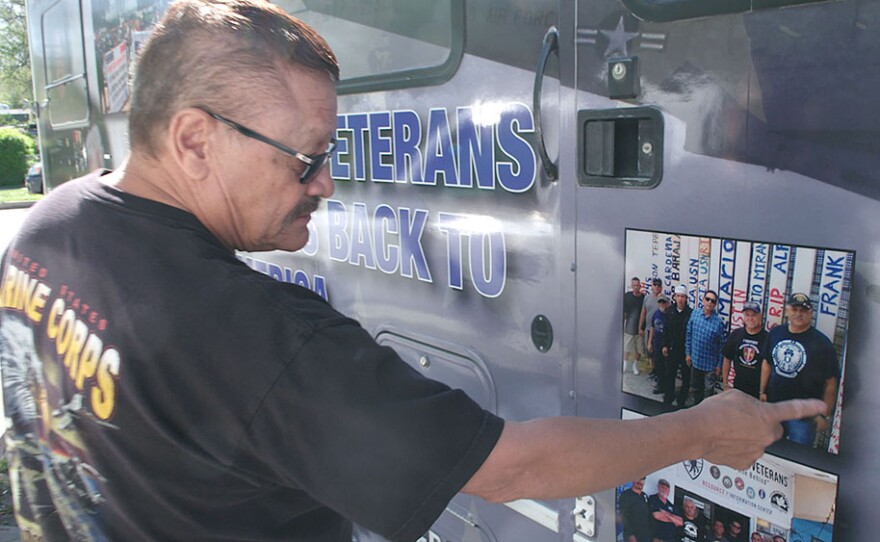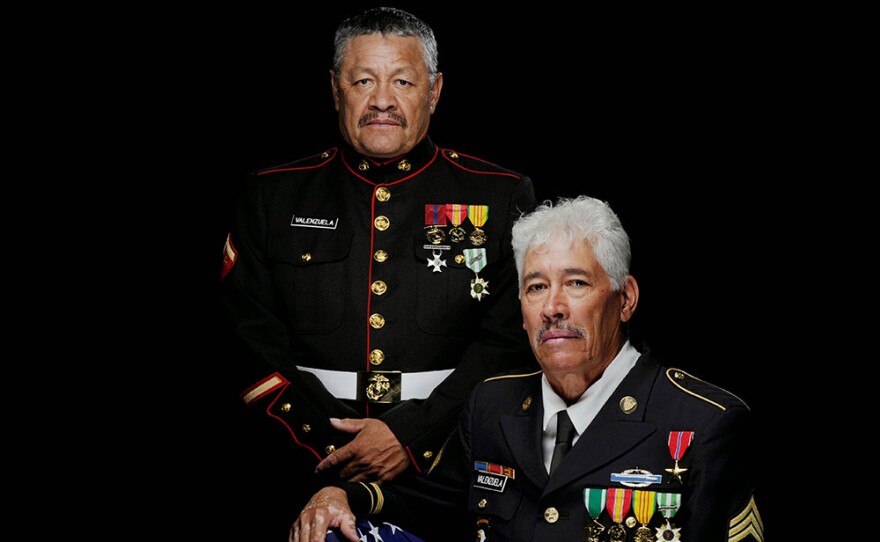Wednesday, Nov. 8, 2023 at 9 p.m. on KPBS 2 + Encore Thursday, Nov. 9 at 4 p.m. on KPBS 2 / No longer available on demand
—Documentary Explores the Plight of U.S. Veterans Living Under the Threat of Deportation—
As teenagers, Valente Valenzuela and his brother Manuel volunteered and were sent to fight in Vietnam. They came home decorated but also physically and psychologically scarred. Now, some 50 years later, they’ve received deportation notices. Shocked and confused, the brothers soon learn they are not alone; thousands of American military veterans have been or are in danger of being deported because of misdemeanor offenses committed after completing their service. Valente and Manuel decide to don their uniforms for one last fight — to “leave no soldier behind” and bring deported veterans and their families back home.
Filmed over seven years, “American Exile” is a deeply personal film about two men seeking justice for themselves and the thousands of others in their situation. Produced by John J. Valadez and Carleen L. Hsu, the film premieres as part of Latino Public Broadcasting’s VOCES as part of PBS’s commemoration of Veteran’s Day.
For Valente, who has crippling PTSD, the anxiety of being under the constant threat of deportation is destroying his life.
Manuel, however, is determined not to give up without a fight. A grandfather and teacher of Tae Kwon Do, he embarks on a cross-country road trip from his home in Colorado to Washington, D.C., to ask President Trump for an executive order ending the deportation of military veterans and their families.

Along the way, he meets other veterans impacted by deportation; people like Zahid Chaudhry, a Pakistani immigrant whose military injuries left him wheelchair-bound and in chronic pain, and Olivia Segura, whose daughter was killed in the Gulf War. Her husband — a Gold Star father — developed a drinking problem after the devastating loss of his daughter, was pulled over by the police and has been incarcerated for three years awaiting deportation.
Valente and Manuel didn’t know it at the time, but their problems were set into motion almost 30 years ago. The 1980s and early 1990s saw the largest wave of immigration in the nation’s history. Twenty-two million people, both with and without documentation, came into the country, mostly from Mexico and Latin America.
President Clinton responded in 1996 by signing the Illegal Immigration and Immigrant Responsibility Act. But the new law had unexpected consequences for veterans. With some 50,000 foreign nationals serving in the U.S. armed forces at any given time, and with over half a million foreign-born veterans living in the United States, many of them found themselves suddenly vulnerable to deportation.
The new law took away judicial discretion and banned judges from considering factors like service to country, family, medals of honor, disability due to military service, and longevity in the country. The law also made minor offenses like shoplifting, driving with an expired license, or possession of marijuana deportable violations.
Some veterans, like the Valenzuela brothers, had minor run-ins with the law decades ago, some committed serious offenses and served jail time, others were simply the victims of bureaucratic errors, but all became deportable. According to immigration scholars, before the 1996 law went into effect, there had never been an American military veteran deported. Today exiled veterans probably number in the tens of thousands, but because no government agency tracks deported veterans, the exact number is unknown.

But the voices of veterans facing deportation has finally been heard. On July 2, 2021, President Biden, ordered the Department of Homeland Security (DHS) to immediately create a process for deported veterans and their families to return home to the United States.
Credits:
Produced by John J. Valadez and Carleen Hsu, directed by John J. Valadez and edited by Carleen Hsu. A co-production of Burning Box Studio and WKAR Public Media/East Lansing in association with Latino Public Broadcasting (LPB) with funding provided by the John D. and Catherine T. MacArthur Foundation, Michigan State University, WKAR, the New York State Council for the Arts, ITVS and the National Association of Latino Arts and Culture. Major funding for VOCES is provided by the National Endowment for the Arts (NEA) and the Corporation for Public Broadcasting (CPB). Presented by PBS SoCal and WKAR Public Media/East Lansing.







